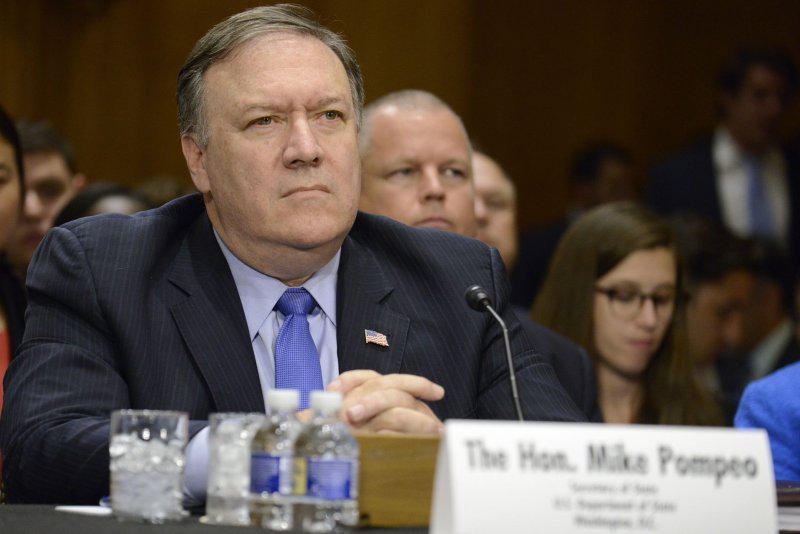U.S. Secretary of State Mike Pompeo said "enormous" changes from Iran will be required to avoid further sanctions pressure from the United States. File Photo by Mike Theiler/UPI |
License Photo
Aug. 6 (UPI) -- With U.S. sanctions relief on Iran winding down on Monday, the U.S. secretary of state said it would take immense changes from Tehran to avoid further pressure.
Under the new sanctions that take effect Tuesday, Iran is barred from purchasing or acquiring U.S. dollars and limited in what it can do with its own currency, the rial, outside of Iranian territory, making it exceptionally difficult for Tehran to conduct business.
With its oil customers already backing away ahead of the next round of sanctions in November, Iran is facing difficult economic challenges.
The sanctions clock started ticking in May when U.S. President Donald Trump pulled out of the multilateral agreement that eased sanctions pressure on the third-largest producer in the Organization of Petroleum Exporting Countries in exchange for commitments to scale back its nuclear ambitions.
Speaking Sunday, U.S. Secretary of State Mike Pompeo said there was still a chance for diplomacy.
"We're very hopeful that we can find a way to move forward, but it's going to require enormous change on the part of the Iranian regime," he said in remarks to the press.
Trump has said the nuclear agreement was flawed and Pompeo claimed Sunday that Iran was the world's largest state sponsor of terrorism.
By Tuesday, the Iranian Central Bank said new measures on foreign currencies will take effect.
"Bringing foreign currencies and raw gold into the country, according to the Central Bank laws, is legal and exempt from value-added tax and legal duties," Abdonnasser Hemati, the head of the Central Bank of Iran, was quoted in the official Islamic Republic News Agency as saying.
Hemmati replaced Central Bank Gov. Valiollah Seif, who led the bank since 2013, in July. In May, Trump included Seif on the list of designated terrorists for his alleged financial support for Lebanese militant and political group Hezbollah.
From the Europeans, it starts to impose blocking statutes on Tuesday in order to protect companies still doing business with Iran. A joint statement from the British, European, French and German foreign ministers expressed deep regret for unilateral action taken by the United States against the Iranian deal, formally the Joint Comprehensive Plan of Action.
"We are determined to protect European economic operators engaged in legitimate business with Iran, in accordance with EU law and with UN Security Council resolution 2231," their statement read.
Resolution 2231 endorsed the JCPOA.
According to S&P Global Platts, Iranian oil production is already under pressure because of approaching sanctions. Production in July of 3.72 million barrels per day was the lowest since January 2017.
November sanctions could isolate Iranian oil from the market.















